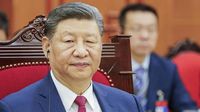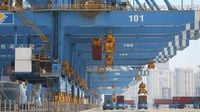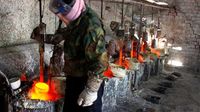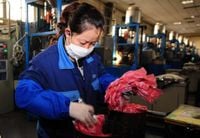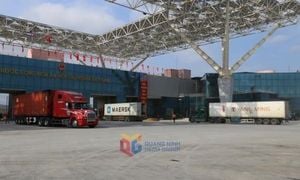In a significant escalation of the ongoing trade conflict, China has suspended the export of several critical rare earth minerals and magnets, a move that could have far-reaching implications not only for the U.S. economy but for industries worldwide. This action comes just two weeks after U.S. President Donald Trump announced hefty tariffs on imports from China, labeling the country as the 'worst culprit' in unfair trade practices.
According to reports from the New York Times and other outlets, the Chinese government halted exports of these vital materials on April 4, 2025, just two days after Trump's self-proclaimed 'Liberation Day,' where he announced his plans for global tariffs. China is responsible for producing approximately 60 percent of the world’s rare earths and an astonishing 90 percent of rare earth magnets, which are essential for various high-tech applications including electric motors, semiconductors, and military equipment.
The new restrictions mean that exporters must now apply for licenses from the Ministry of Commerce, a process that could take anywhere from six weeks to several months. This regulatory change is part of a broader strategy by Beijing to establish a new export control system that could permanently limit the delivery of certain rare earths and magnets to specific companies, particularly those in the U.S. defense sector.
Experts warn that this export suspension poses a serious risk to U.S. manufacturers, particularly in the automotive and defense industries. "If factories in Detroit and elsewhere run out of powerful rare earth magnets, it could prevent them from assembling electric vehicles and other products," the New York Times reported.
In response to the tariffs imposed by the U.S., which now include additional duties of up to 145 percent on imports, China has retaliated with counter-tariffs of 125 percent on U.S. goods. The situation has created a complex web of trade tensions, with both sides digging in their heels. Trump, addressing the situation on his social media platform Truth Social, stated, "Nobody gets away with the unfair trade balances. Especially not China, who treats us by far the worst." He also indicated plans to introduce new tariffs related to the semiconductor industry.
The implications of China's export suspension extend beyond the United States. Industries around the globe, including those in Europe, are also at risk due to their reliance on Chinese rare earths. In 2023, China accounted for 93 percent of the global demand for the processing of these minerals, highlighting its near-monopoly in this critical sector.
As the trade war intensifies, the stakes are high. The U.S. industry, which has stockpiled supplies to last approximately two months, may soon find itself in a precarious position as the availability of rare earths dwindles. Mark Smith, CEO of NioCorp, a company that mines rare earths in the U.S., described China's approach as a "precision strike" against the U.S. defense industry, emphasizing that the U.S. has long ignored its vulnerability regarding critical raw materials.
China's decision to halt exports is a calculated move that demonstrates its leverage in the trade dispute. While the U.S. seeks to impose tariffs as a means of protecting its domestic industries, China’s control over rare earths presents a formidable challenge. The minerals are not only crucial for consumer electronics but also for advanced military technologies, such as drones and autonomous systems, which are increasingly seen as the future of warfare.
The complexity of the situation is further compounded by the fact that while China dominates the rare earth market, the export of these materials constitutes a small fraction of its overall trade. Thus, a prolonged suspension of exports could harm China's reputation as a reliable supplier, potentially pushing customers to seek alternatives in other countries, albeit with significant time and investment required to develop new sources.
As the situation develops, it remains unclear when or if new export licenses will be issued, and when the global market will regain access to these essential materials. The uncertainty surrounding the availability of rare earths has left many manufacturers on edge, as they navigate the fallout from this escalating trade war.
In the meantime, the U.S. government continues to explore its options, with Trade Minister Howard Lutnick announcing that new tariffs on Chinese imports are forthcoming. The trade war between the two nations shows no signs of abating, and as both sides prepare for a protracted conflict, industries around the world are bracing for the potential fallout.
This latest round of trade tensions serves as a stark reminder of the interconnectedness of global supply chains and the critical importance of rare earths in modern technology. As the situation unfolds, stakeholders across various sectors will be watching closely, hoping for a resolution that can mitigate the risks posed by these trade disputes.
